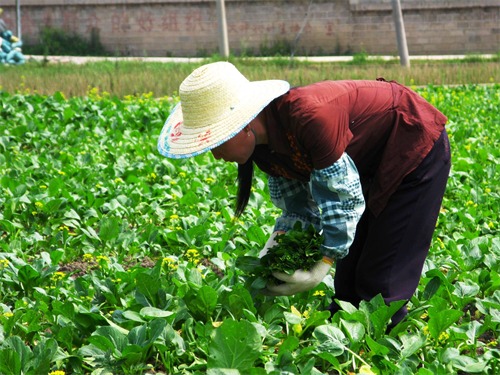
Agricultural News
Walmart Announces Plan to Go Local on a Global Scale
Fri, 15 Oct 2010 6:15:05 CDT
 During a special presentation in Bentonville, Arkansas on Thursday, Walmart launched its new global commitment to sustainable agriculture that will help small and medium sized farmers expand their businesses, get more income for their products, and reduce the environmental impact of farming, while strengthening local economies and providing customers around the world with long-term access to affordable, high-quality, fresh food.
During a special presentation in Bentonville, Arkansas on Thursday, Walmart launched its new global commitment to sustainable agriculture that will help small and medium sized farmers expand their businesses, get more income for their products, and reduce the environmental impact of farming, while strengthening local economies and providing customers around the world with long-term access to affordable, high-quality, fresh food.
"More than 1 billion people around the world rely on farming and hundreds of millions of them live on less than $2 a day," said Mike Duke, Walmart president and CEO. "Globally, with a booming population, food production must increase roughly 70 percent to feed 9 billion people in 2050." (The picture here is an example of the farm workers they hope to help in countries like China.)
Duke continued, "Through sustainable agriculture, Walmart is uniquely positioned to make a positive difference in food production -- for farmers, communities and customers. Our efforts will help increase farmer incomes, lead to more efficient use of pesticides, fertilizer and water, and provide fresher produce for our customers."
Walmart's sustainable agriculture strategy is divided into three broad areas, each containing specific supporting goals to help the company track and report its progress.
Support farmers and their communities
More than a billion people rely on agriculture for subsistence. By the end of 2015 in emerging markets, Walmart will help many small and mid-sized farmers gain access to markets by:
* selling $1 billion in food sourced from 1 million small and medium farmers;
* providing training to 1 million farmers and farm workers in such areas as crop selection and sustainable farming practices -- the company expects half of those trained to be women; and
* increasing the income of the small and medium farmers it sources from by 10 to 15 percent.
* In the U.S., Walmart will double its sale of locally sourced produce and increase its purchase of select U.S. crops.
Produce more food with fewer resources and less waste
Walmart has one of the world's largest food supply chains and is committed to reducing and optimizing the resources required to produce that food and driving more transparency into its supply chain. For the first time Walmart will ask suppliers about the water, energy, fertilizer and pesticide they use per unit of food produced. The goals include:
* accelerating the agricultural focus of the Sustainability Index, beginning with a Sustainable Produce Assessment for top producers in its Global Food Sourcing network in 2011;
* investing more than $1 billion in its global fresh supply chain in the next five years; and,
* reducing food waste in its emerging market stores and clubs by 15 percent and by 10 percent in stores and clubs in its other markets by the end of 2015.
Sustainably source key agriculture products
Farming practices are having unintended side effects, from deforestation of the world's rainforests to increasing greenhouse gas emissions. Walmart will focus on two of the major contributors to global deforestation, palm oil and beef production.
* Require sustainably sourced palm oil for all Walmart private brand products globally by the end of 2015. Sourcing sustainable palm oil for our U.K. and U.S. private brand products alone will reduce greenhouse gas emissions by 5 million metric tons by the end of 2015.
* Expand the already existing practice of Walmart Brazil of only sourcing beef that does not contribute to the deforestation of the Amazon rainforest to all of our companies worldwide by the end of 2015. It is estimated that 60 percent of deforestation in the Brazilian Amazon is related to cattle ranching expansion.
To help reach these goals, Walmart's global markets have also established country specific commitments. For example:
* In India, source 50 percent of its fresh produce through its Direct Farm Program;
* In China, upgrade 15 percent of Direct Farm products from Green to Organic certified;
* In Japan, reduce in-store food waste by 35 percent and increase the number of produce farmers it sources from directly from 15,000 to 17,000; and
* In Canada, purchase 30 percent of the produce assortment locally on an annual basis.
In the U.S., Walmart's Heritage Agriculture program will help the company double the sale of locally grown food. The program focuses on sourcing produce from states and regions with long histories of agricultural production. Three of Walmart's largest Heritage Agriculture programs are in the I-95 corridor along the East coast, the Delta region in the South and the Mid-America region of the Midwest. Sourcing examples include tomatoes, blueberries and broccoli in the I-95 corridor, peaches, cucumbers and strawberries in the Delta region and potatoes, onions and apples in the Mid-American program.
Click here for more from the Walmart website about their efforts to Go Local
WebReadyTM Powered by WireReady® NSI
Top Agricultural News
More Headlines...




















